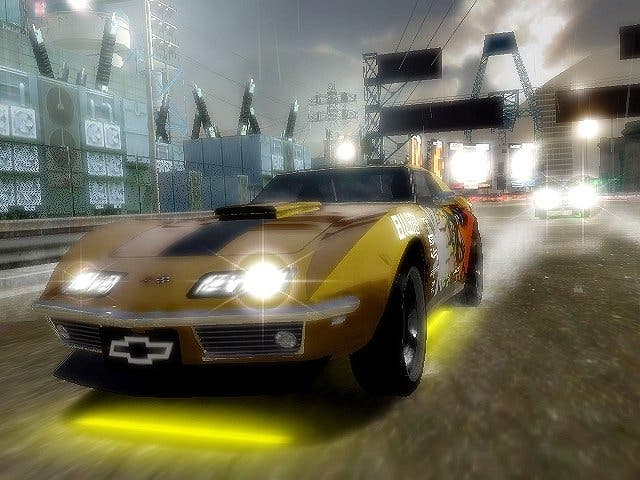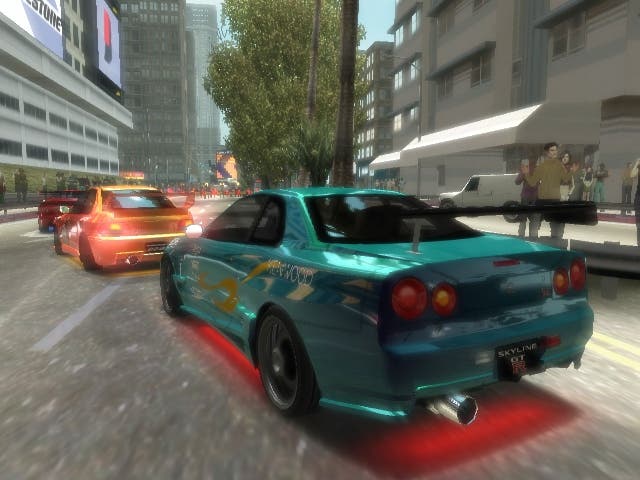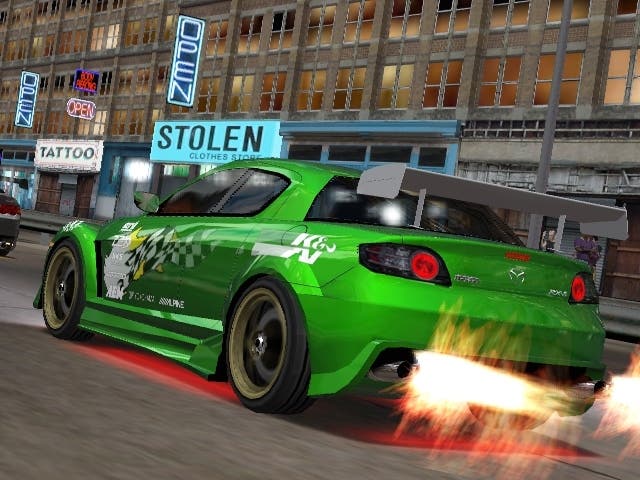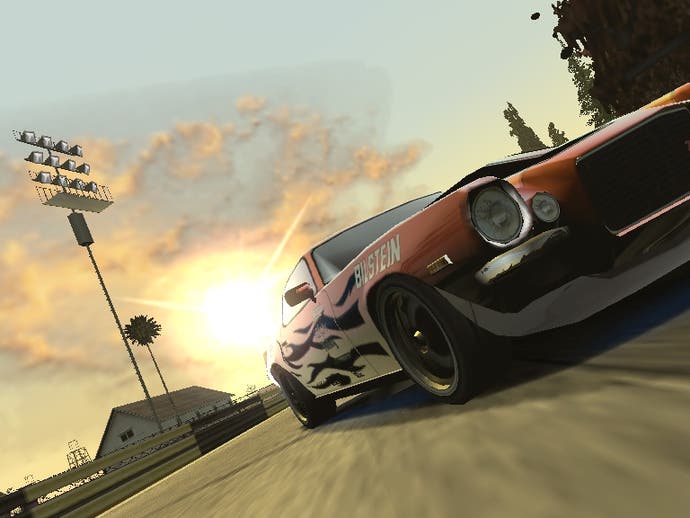Juiced
Pure or concentrated?
Nine months is a long time. Enough time for your football team to be relegated, enough time to spring a new human being screaming forth into the world, and enough time for the average Eurogamer staffer to have reviewed 180 games; at least half a dozen of which are competing for the same pocket money that Juiced is aiming to snaffle.
In the last nine months there has been an almost unprecedented surge of blisteringly high quality racing titles released: any game trying to compete with the likes of Forza, Gran Turismo 4, Burnout 3, Midnight Club 3 and Need For Speed Underground 2 has basically got its work cut out right from the beginning. Throw in cheap (but still relatively recent) back catalogue like TOCA Race Driver 2 and Project Gotham Racing 2, and also-rans like Street Racing Syndicate and Enthusia and THQ has a mountain to climb.
Taking the Acclaim
Nine months ago when the now-defunct Acclaim was days away from releasing the game, Juiced would have been considered a worthy addition to the street-racing scene - one with a slightly more realistic slant that fits snugly between the simulation values of GT, but with the street-racing theme that's proven so popular over the last few years.
In fact the numerous reviews that appeared last September, when the game was due to ship, rated the game reasonably positively; largely in the 70s. It wasn't far off being a killer app, reasoned THQ. So the US publishing giant snapped it up and granted Juice Games the practically unique opportunity to take stock of all the reviewer feedback and critical reaction and buff up the game to turn it into the racing franchise that THQ has always lacked in its portfolio. A grand idea for sure, and one that other time pressured developers must have been eyeing enviously as Juice Games busily poured more than five more months into the project to beef up the content, overhaul the presentation, improve the AI and generally polish it up to make it an irresistible title.
There were other sound reasons for delaying it for nine months, though. Like the small matter of Juiced potentially going head to head with competing games. First, Need For Speed Underground 2, then Midnight Club 3. The latter, in particular must have been a perpetual annoyance to THQ, first slipping out of Christmas before finally hogging the April slot. Throw in other driving distractions like GT4 (March) and Forza (May) and it's as if its rivals were queuing up to scupper its chances. Now finally slotted into the relative calm of a mid-June release is it too late to make an impression? Don't game sales dramatically drop off at this time of year? That's true enough, but if Juiced really was as classy as THQ was hoping it would be then June 17th would be as good a time as any.
Lapped

But despite all the good intentions, the extra investment, the spit and polish, and the massive PR and marketing campaign that the team has worked so very hard to put together, the harrowing, unavoidable conclusion we've come to is Juiced simply isn't as exciting a racing game as the competition.
That's not to say it's a bad game, because it plainly isn't. Juiced does a lot of things well, but it's hamstrung from start to finish by the fact that nothing incredible ever leaps out at you. Part of the problem is simply that exceptionally high standards set elsewhere leave it wanting in several areas. At the heart of the game beats plenty of good intentions, but good intentions don't win awards. The kind of players that have weathered hundreds of hours in the company of similar games need their preconceptions blown away, and Juiced labours with a clunky progression system, competent but not outstanding visuals, little in the way of damage modelling and handling that will neither satisfy the arcade racer nor the simulation buff. Needless to say, these are fundamental issues for all racing game fans.
If you hadn't played a racing game for a while then you might assume Juiced has perfectly serviceable technology that compares favourably with the competition, but compared to the best it's just not in the same league. At no stage does it smack you in the face with the wow factor that a new pretender to the throne requires. The tracks are pristine of construction with Ridge Racer skylines and an air of blue sky freshness, while the cars gleam with promise. When reflections flash across the bodywork, rain droplets drizzle their way down the screen and water splashes from beneath the tyres in the midst of a race Juiced has the brief capacity to impress. But it's not enough. It's nowhere near as realistic as GT, not as exciting as the face-wobbling carnage of Burnout, and fails to be as chaotic as the traffic dodging madness of Midnight Club.
Pretty vacant
Unlike its street-racing contemporaries Juice favours the cordoned off empty street approach, and as such it doesn't help its cause that the tracks feel vacant, lack excitement and need life. You could argue the same thing about Gotham, but in that instance you had the novelty of real-life cities, cutting edge visuals and an excellent progression system that drags you through for hours on end. In spirit, Juiced is well and truly aligned with NFSU and MC whether it wants to be or not, but its look and feel lacks its own identity and character, and at times it's hard to distinguish some of the tracks from one another.
Another thing that's becoming less acceptable these days is the superficial damage modelling; not just in terms of the visual side but in handling terms too. Sure it shows up the odd dent, spark and scratch, but there's no meaningful sense that you're beating up your car, and there's certainly no handling penalty for piling into barriers at high speed. For a game that the publisher and developer have repeatedly held up as the more credible, simulation-minded alternative in the street-racing genre, there's a lack of discernable evidence that the game either looks or feels realistic.
While we're on the subject of the handling, it's fair to say it isn't Juiced's strong point. On the plus side it doesn't let you get away with murder like other games do. Some players might actually prefer that it favours a more real-life driving style with considered use of speed and footbrake (as opposed to the cheap get-out clause of the handbrake turn, which in Juiced appears to be the slower of the two options, oddly).
However, the illusion of real life is shattered when it proceeds to flash up arcade style 'brake' warnings that are completely useless in the context of winning a race and bear little resemblance to what you really need to do. On one hand it feels like Juiced is afraid of being classed as 'too arcadey', but on the other ends up trying to be all things to all people and most likely appealing to neither. Regardless of whether you favour the arcade extreme of Burnout or Midnight Club or the exacting realism of GT, this is a sticky middle ground that few games other than TOCA Race Driver have ever successfully nailed. Of course, eventually you will adapt to Juiced's style. Some might even like it, but it's not one we ever felt truly comfortable with even after several days of playing it.
Fight to the finish

One area Juice Games reportedly improved was the AI, and in this instance we have to agree that compared to many similar games it's far more in line with what we'd expect a racing game to do. Unlike other games the AI doesn't 'hang back' if you fall behind, and if you start to find yourself way down the pack, the chances are that's your lot. Likewise, they're aggressively trying to win and won't miss a trick, even if it means saving their Nitrous for the finishing straight. Time and again we lost out to this tactic, and on that score we admired what Juiced was doing. Races do feel challenging and tough; car classes and levels of modification do have a significant bearing on your chances of success and it's apparent after only a few hours play that Juiced is no easy procession through the various car classes. It's exacting, and often punishing. As far as a meting out a decent challenge, Juiced can be a tough nut to crack if you don't go about it in a considered and patient manner; and that's where opinion has really polarised about its relative merits.
Essentially Juiced has its own unique progression system related to the level of respect your opponents have for you. At the start just T.K. of the Urban Maulerz crew has any interest in your prospects, but soon the other seven challengers will start to notice your antics. Each one favours a certain aspect of street racing; for example the level of customisation you've applied to your car, or your skill in sprint races, or how willing you are to bet on other drivers, and so on.
At the start of the Career mode you pocket around $41,000 after a face off with TK and it's onto the main event. With just a handful of Class 8 cars to choose from, including a Beetle GLS 1.8T and a Peugeot 206 GTi there's little to really get excited about in the early stages. Soon enough, though, you can begin to pimp up your ride in a number of ways that enhance the overall handling, speed, acceleration and braking, alongside the usual array of visual customisations. With a reported 7.5 trillion customisation possibilities you should never go short of ways to make your ride look just the way you want it.
Racing line
With races available via a racing calendar, it's up to you which type you want to go for. You can either take some career advice, or choose ones that suit you, but on the whole you'll be playing either Point To Point, Circuit races, Sprints, or attempting Show Offs, which task you with racking up style points based on your ability to pull off 180s, Donuts, Boomerangs and the like.
But the key thing about the progression system is that money talks, and the real deal breaker is how delicately balanced your bank account really is. While most of the early races are free, eventually you start needing to put money down on an entry fee, while big money can be earned in races by betting on who you think you're going to beat. Early on, it's fairly straightforward to whup T.K. and clean him out, spend the money on the three levels of mods that gradually become available and progress onwards and upwards.
Soon enough more cars become available in the dealership (a total of 50 real-life cars feature), and you'll be able to add to your collection and begin moving up through the classes - based on the level of BHP. Mod your car up over 199 BHP, for example, and you move into Class 7, meaning you're suddenly facing much better cars than before. The general rule of thumb would suggest that if you've got a pimped up ride right on the upper limit boundary between classes then you ought to win, but it doesn't always seems to follow.
Class act

As you move into Class 5 and Class 6 cars, the pressure really seems to pile on, and from being a manageable experience you can suddenly find yourself unexpectedly out of your depth. In such scenarios, the answer is simply to make your car better: mod it up and win races. But mods cost money; quite a lot of money. The unavoidable temptation is to bet against the weakest racers so that even when you don't win you can scoop a prize regardless. Even then, the weakest racer can suddenly pull off a shock result, and from being fully confident of beating them, you're suddenly out of pocket. Given the amount of money you need to progress, you're always tempted to bet big, but one bad bet can completely rob you of most of your savings, and then you're into a horrible vicious circle. Not only are you under-equipped to win races, you may well not even have enough funds to enter certain races at all, and can find yourself scrapping around the calendar for the free races.
But even winning in the free races doesn't help all that much because every single time you enter a race there's a cost associated, with often hefty repair bills resulting and subsequently robbing you of a chunk of your prize money. When you're down on your luck, it can take an age to get back on track again, and there's no discernable shortcut either. It's just a case of toughing it out or give up. Even dropping down a class (by, for example, tweaking your car set up downwards so its BHP levels can qualify) doesn't make life easier for you. It basically seems that the further along the calendar you go, the tougher the races get. It's a system based on assumptions that's not really geared up to keeping the player racing; Juiced starts to feel less like fun and more like hard work, and surely that wasn't the point. To introduce an idea that has the potential to make Juiced a damned frustrating experience unless you're a) forewarned about them b) lucky c) improbably skilful or d) ultra ultra cautious is just daft.
Any racing game should set out to be fun all the way down the grid, and should always aim to encourage the player to try try try again. Keep the audience entertained, keep them racing, make it fun, and make it addictive. Absolutely, categorically do not design a progression system that encourages (although doesn't obligate - there's a big difference) players to gamble everything they have in order to afford the upgrades that they need to win the races that make them the money they need to afford the upgrades. While most racing games will just allow players to try failed races again, Juiced actually makes it mandatory that if you fail, you fail - even switching the console off mid-race can't change a result.
Consistently inconsistent

But Juiced is inconsistent in this regard to a maddening degree. For example, now and then racers will challenge you to a one-off task, like racing a lap in under a specified time, or keeping your speed above 50mph all the way around a circuit. In these instances you can try as many times as you like, yet in the dreaded Pink Slip races (in which you are offered the chance to gamble your car for theirs) the game even warns you in advance that interrupting the power supply will lose you the car. Ouch. What if it wasn't your fault? Surely racing games have always been about trying again? Not in Juiced. Failure is permanent, and it's this bloody mindedness that will drive most racing gamers to distraction.
And if that wasn't enough, Juiced also features the ability to hire AI racers to race on your behalf. In fact one of the rival crews will only have respect for you if your team-mates get out on the track, so they're basically mandatory if you want to get through the game. The problem here is that you have to sit for several minutes watching an AI race. Sure you can modify your AI driver's level of aggressiveness in three degrees, but that's all there is to it. Other than that you have to watch a race that you can't speed up, and it's a drag to say the least. You can similarly 'attend' races to simply watch them, or bet on the outcome. Again, it's five or so minutes of watching AI cars drive around a track with no speed up option; not the most exciting thing you'll ever do in your life.
There are, of course, other modes: the perfunctory Arcade mode, Practise, and online play for up to six racers. Arcade just gives you more precise choice over where you want to race and what with, but pales in terms of interest value next to Career. Online play, though, does have several interesting things going for it that do help shore up the package somewhat. For a start you can race for Pink Slips against human opponents, which is either a brilliantly tense all or nothing competitive stroke of genius, or something that will allow people to massively cheat and shortcut their way to building up their car collection. Given that you can use these cars in the Career mode, it's an option open to massive abuse.
The six-player racing is solid, though, and basically gives you the chance to play through the various tracks setting whatever conditions you like, in whatever mode you fancy in either ranked form or just for fun. It's a shame the career and online modes aren't linked up in PGR fashion, but it's a good fun arena to show off without the same degree of money-obsessed pressure that the single player mode ties itself in knots with.
Squeezed
There's no doubting Juiced is a quality game, but it veers off the racing line with a flawed progression system that starts off promisingly but penalises players too harshly and makes it a frustrating experience to claw your way back. Once you factor on top the game's technical standing and line it up next to the competition, it's hard to walk away from it singing its praises. It's good, but sadly just not good enough to recommend you go out and buy it.


